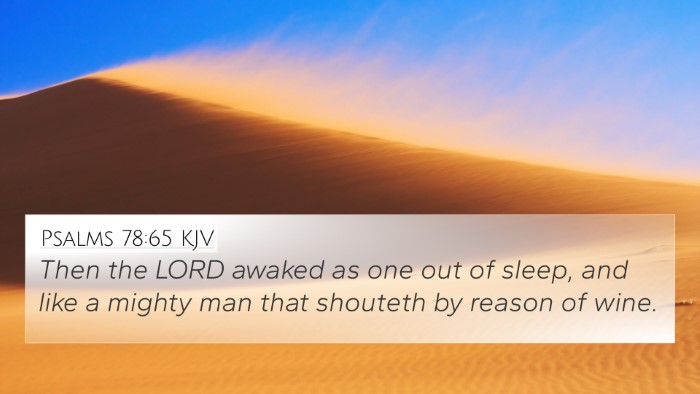Psalms 74:11 Meaning and Interpretation
Psalms 74:11 states, "Why withdrawest thou thy hand, even thy right hand? pluck it out of thy bosom." This plea reflects the psalmist's deep sense of abandonment and desire for divine intervention. The context of this verse is crucial as it emerges from a lamentation concerning the destruction of the temple and the suffering of God's people.
Contextual Overview
The verse situates itself within a broader narrative of distress and mourning over the desecration of God’s sanctuary. Public domain commentaries provide insights into the emotional turmoil experienced by the psalmist, who questions God’s apparent inactivity during times of trouble.
- Matthew Henry's Commentary:
Henry emphasizes the metaphor of God's right hand, symbolizing His power. The psalmist’s cry indicates a yearning for God’s might to be revealed in rescuing His people from oppression.
- Albert Barnes' Notes:
Barnes suggests that God's hand is often a representation of His judgement and protection. The psalmist's request indicates both a recognition of God's authority and a desperate appeal for assistance.
- Adam Clarke’s Commentary:
Clarke points to the spiritual dilemma presented: the seemingly hidden power of God when his people are in despair. The phrase "pluck it out of thy bosom" represents a desire for God's active role to become evident again.
Thematic Connections
Many thematic Bible verse connections arise from Psalms 74:11, highlighting the motif of divine silence during calamity. This theme echoes throughout the Scriptures as it connects to similar sentiments expressed in other Bible verses:
- Psalms 10:1 - "Why standest thou afar off, O LORD? Why hidest thou thyself in times of trouble?"
- Psalms 22:1 - "My God, my God, why hast thou forsaken me?"
- Psalms 83:1 - "Keep not thou silence, O God: hold not thy peace, and be not still, O God."
- Isaiah 51:9 - "Awake, awake, put on strength, O arm of the LORD; awake, as in the ancient days."
- Lamentations 5:20 - "Wherefore dost thou forget us forever, and forsake us so long time?"
- Matthew 27:46 - "Eli, Eli, lama sabachthani?" - the words of Jesus reflecting a profound sense of abandonment.
- Hebrews 10:31 - "It is a fearful thing to fall into the hands of the living God." - expressing the serious nature of divine silence.
Exploring Cross-Referencing Biblical Texts
Cross-referencing biblical texts can deepen our understanding of Psalms 74:11. These connections between Bible verses help illustrate recurring themes of abandonment and divine intervention:
- Looking at the cries for help in times of trouble can enhance our understanding of the Psalms as a whole.
- Examining how other biblical figures expressed their struggles can provide insight into the human experience of faith under hardship.
- Scriptural cross-referencing allows us to draw parallels between the Old Testament laments and New Testament revelations of God’s presence in suffering.
To Use Bible Cross-References:
Those studying this verse can utilize tools like a Bible concordance or cross-reference Bible study methods. Here are some methods for finding connections:
- Utilizing a concordance to locate instances of similar phrases or themes.
- Engaging with Bible study guides that focus on thematic connections.
- Creating a personal chain reference of relevant verses to illuminate understanding.
The Importance of Context in Biblical Interpretation
Understanding Psalms 74:11 within its historical context reveals a collective mourning among the Israelites during their captivity and the destruction of their temple. This time of grief is mirrored in various passages throughout Scripture, thereby highlighting the enduring human condition when faced with divine silence.
Conclusion
Psalms 74:11 serves as a poignant reminder of the struggle inherent in the human experience of faith, particularly in times of distress. By engaging with public domain commentaries and applying tools for Bible cross-referencing, believers can uncover a deeper understanding of scripture. The connections drawn from this verse to others not only enhance our comprehension but also resonate with our own life experiences.






